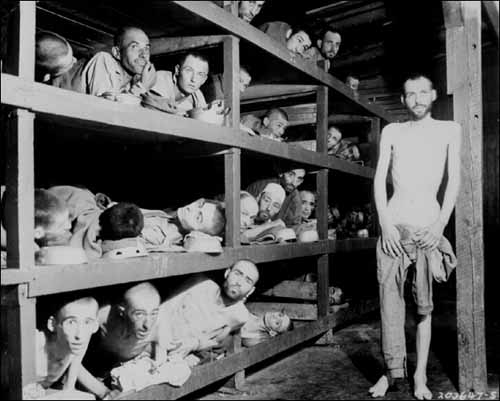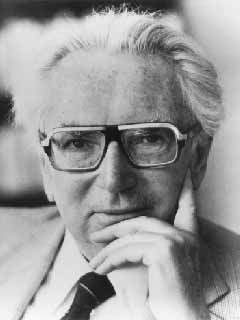"WHY DO YOU NOT COMMIT SUICIDE?"
DR. FRANKL ASKS HIS PATIENTS from preface to Man's Search for Meaning by Gordon W. Allport
"...in one life there is love for one's children to tie to; in another life, a talent to be used; in a third, perhaps only lingering memories worth preserving... As a long-time prisoner in bestial concentration camps he [Viktor Frankl] found himself stripped to naked existence. His father, mother, brother, and his wife died in camps or were sent to gas ovens, so that, excepting for his sister, his entire family perished in these camps. How could he - every possession lost, every value destroyed, suffering from hunger, cold and brutality, hourly expecting extermination - how could he find life worth preserving?"
 We stumbled on in the darkness, over big stones and through large puddles, along the one road running through the camp. The accompanying guards kept shouting at us and driving us with the butts of their rifles. Anyone with very sore feet supported himself on his neighbor's arm. Hardly a word was spoken; the icy wind did not encourage talk. Hiding his hand behind his upturned collar, the man marching next to me whispered suddenly: "If our wives could see us now! I do hope they are better off in their camps and don't know what is happening to us."
We stumbled on in the darkness, over big stones and through large puddles, along the one road running through the camp. The accompanying guards kept shouting at us and driving us with the butts of their rifles. Anyone with very sore feet supported himself on his neighbor's arm. Hardly a word was spoken; the icy wind did not encourage talk. Hiding his hand behind his upturned collar, the man marching next to me whispered suddenly: "If our wives could see us now! I do hope they are better off in their camps and don't know what is happening to us."

Both a concentration camp prisoner and world-respected author and psychotherapist in his lifetime, Viktor Frankl writes the following advice about happiness:
"Again and again I therefore admonish my students in Europe and America: Don't aim at success - the more you aim at it and make it a target, the more you are going to miss it. For success, like happiness, cannot be pursued; it must ensue, and it only does so as the unintended side effect of one's personal dedication to a cause greater than oneself or as the by-product of one's surrender to a person other than oneself. Happiness must happen, and the same holds for success: you have to let it happen by not caring about it. I want you to listen to what your conscience commands you to do and go on to carry it out to the best of your knowledge. Then you will live to see that in the long-run - in the long-run, I say! - success will follow you precisely because you had forgotten to think about it."
Even in the degradation and abject misery of a concentration camp, Frankl was able to exercise the most important freedom of all - the freedom to determine one's own attitude and spiritual well-being. No sadistic Nazi SS guard was able to take that away from him or control the inner-life of Frankl's soul. One of the ways he found the strength to fight to stay alive and not lose hope was to think of his wife. Frankl clearly saw that it was those who had nothing to live for who died quickest in the concentration camp.
"He who has a why for life can put with any how."
Frederick Nietzsche
Frankl wrote the following while
being marched to forced labor in a Nazi concentration camp:
That brought thoughts of my own wife to mind. And as we stumbled on for miles, slipping on icy spots, supporting each other time and again, dragging one another on and upward, nothing was said, but we both knew: each of us was thinking of his wife. Occasionally I looked at the sky, where the stars were fading and the pink light of the morning was beginning to spread behind a dark bank of clouds. But my mind clung to my wife's image, imagining it with an uncanny acuteness. I heard her answering me, saw her smile, her frank and encouraging look. Real or not, her look then was more luminous than the sun which was beginning to rise.
A thought transfixed me: for the first time in my life I saw the truth as it is set into song by so many poets, proclaimed as the final wisdom by so many thinkers. The truth--that love is the ultimate and the highest goal to which man can aspire. Then I grasped the meaning of the greatest secret that human poetry and human thought and belief have to impart: The salvation of man is through love and in love. I understood how a man who has nothing left in this world may still know bliss, be it only for a brief moment, in the contemplation of his beloved. In a position of utter desolation, when a man cannot express himself in positive action, when his only achievement may consist in enduring his sufferings in the right way--an honorable way--in such a position man can, through loving contemplation of the image he carries of his beloved, achieve fulfillment. For the first time in my life, I was able to understand the words, "The angels are lost in perpetual contemplation of an infinite glory."
In front of me a man stumbled and those following him fell on top of him. The guard rushed over and used his whip on them all. Thus my thoughts were interrupted for a few minutes. But soon my soul found its way back from the prisoners existence to another world, and I resumed talk with my loved one: I asked her questions, and she answered; she questioned me in return, and I answered...
My mind still clung to the image of my wife. A thought crossed my mind: I didn't even know if she were still alive, and I had no means of finding out (during all my prison life there was no outgoing or incoming mail); but at that moment it ceased to matter. There was no need to know; nothing could touch the strength of my love, and the thoughts of my beloved. Had I known then that my wife was dead, I think that I still would have given myself, undisturbed by that knowledge, to the contemplation of that image, and that my mental conversation with her would have been just as vivid and just as satisfying. "Set me like a seal upon thy heart, love is as strong as death."
Man's Search for Meaning

No hay comentarios:
Publicar un comentario